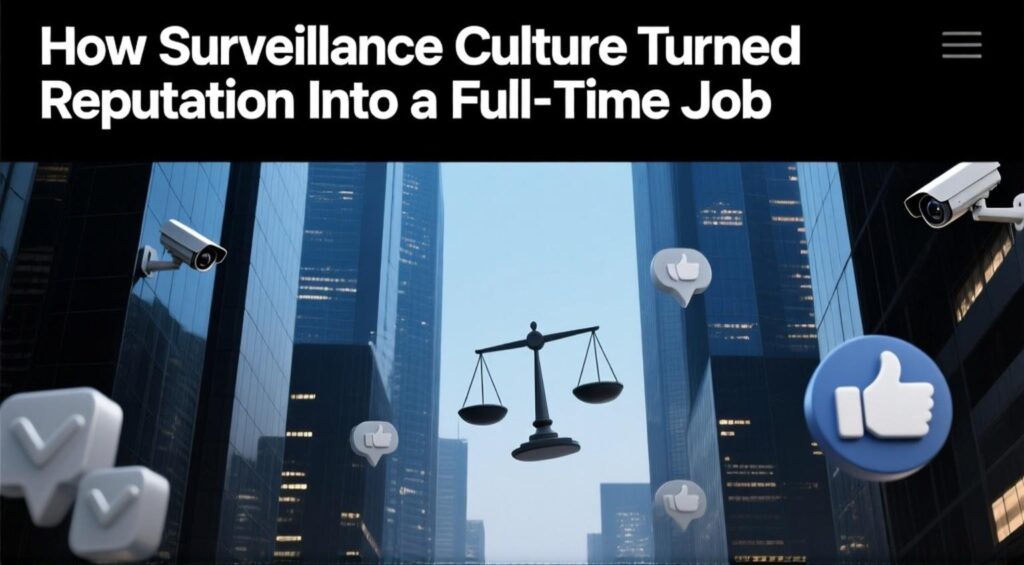Every online misstep can haunt your career for years.
Welcome to surveillance culture—a world where privacy feels obsolete, algorithms never sleep, and reputation has become a full-time responsibility.
From Cambridge Analytica’s data-mining scandals to facial recognition tools scanning millions of faces daily, modern life operates under constant observation. What began as social connection has evolved into a system of exposure, where every click, comment, and photo becomes part of your permanent record.
The Origins of Constant Watchfulness
The idea of continuous surveillance began long before the Internet. Philosopher Jeremy Bentham’s 1787 Panopticon proposed a structure designed to make people regulate their behavior under the assumption that they might be watched. Later, Michel Foucault’s Discipline and Punish reframed the concept as a metaphor for power and social control.
Today, that metaphor has become reality.
Instead of prison towers, we have algorithms, cookies, and cameras tracking billions of actions every second. According to the Electronic Frontier Foundation, facial recognition, biometric authentication, and behavioral analytics rose by 40% last year alone.
Facial recognition software like Clearview AI uses public images to identify individuals in real time. GPS-enabled smartphones quietly log every movement. “Smart” home devices record conversations. Data once considered personal now circulates freely between platforms, advertisers, and governments—often without consent.
When Reputation Becomes Data
Before the internet, reputation lived in local memory and faded over time.
Now, one impulsive tweet or photo can go global in seconds—and stay searchable forever. A 2022 Harris Poll found that 70% of people say a single online misstep has affected their personal or professional lives for years afterward.
Reputation used to be built through relationships. Today, it’s defined by algorithms. Employers, insurers, lenders, and strangers judge based on search results. The concept of a “second chance” has eroded under the weight of digital permanence.
Even routine online behavior—shopping, commenting, scrolling—feeds the reputation economy. As Shoshana Zuboff notes in The Age of Surveillance Capitalism, every digital action becomes a data point that fuels predictive models, advertising profiles, and even hiring decisions.
The Pressure to Self-Censor
Living under constant scrutiny changes how people behave.
A 2021 PEN America survey found that 70% of users now self-censor online to avoid social or professional consequences. Many delete old posts, filter opinions, and limit public participation. The fear isn’t irrational—41% of employers review social media activity before making hiring decisions, according to the Society for Human Resource Management.
The result is widespread anxiety and creative paralysis. People no longer express ideas freely; they curate themselves in real time. What was once a tool for expression has become a stage for judgment.
The Corporate Side of Surveillance
Surveillance culture isn’t just social—it’s commercial.
Corporations like Google process 5.6 billion searches daily, feeding a global data industry worth over $200 billion. Apps track behavior through permissions most users never read, and data brokers sell personal profiles for as little as fifty cents each.
While privacy laws such as the GDPR and California Consumer Privacy Act attempt to impose limits, enforcement is uneven. As a result, individuals bear the burden of monitoring their own exposure.
Basic tools like Ghostery and Signal help block trackers and encrypt messages, but they can’t remove what’s already archived online. Once information circulates, it rarely disappears—unless you take deliberate steps to manage it.
The Rise of Reputation Management

As privacy erodes, reputation management has become essential. The online reputation management (ORM) industry, valued at over $15 billion, reflects how deeply surveillance culture has blurred the line between identity and data.
Companies like NetReputation, specialize in helping individuals and businesses restore credibility after damaging exposure. From removing harmful search results and mugshots to pushing down false or misleading content, these services address the gaps privacy laws can’t yet fill.
NetReputation’s process combines:
- AI-driven monitoring to detect threats before they spread.
- Content suppression and rebuilding to elevate truthful, positive material.
- Privacy protection to minimize personal data leaks from brokers and outdated listings.
This hybrid approach—legal, technical, and strategic—has helped thousands regain control of their online identities after misinformation, leaks, or public backlash.
Reclaiming Control in a Watched World
No one can completely escape surveillance, but control is still possible.
Start with practical steps:
- Audit your digital footprint
- Remove outdated or sensitive content
- Use privacy-first tools
- Secure your domains and handles
- Work with a trusted ORM provider
Surveillance culture rewards transparency without consent—but you can still choose what defines you.
The Bottom Line
The internet was once built on openness. Today, it runs on observation.
Every post, search, and click contributes to a public version of you—accurate or not.
You can’t control who’s watching, but you can control what they see.
And with expert support from NetReputation, your digital footprint can reflect what matters most: truth, integrity, and control over your name.


More Stories
7 Hidden Spotify Features To Try In 2026
CloudySocial Brandon: The Future of Social Networking
Minison CloudySocial: The Future of Social Media Management